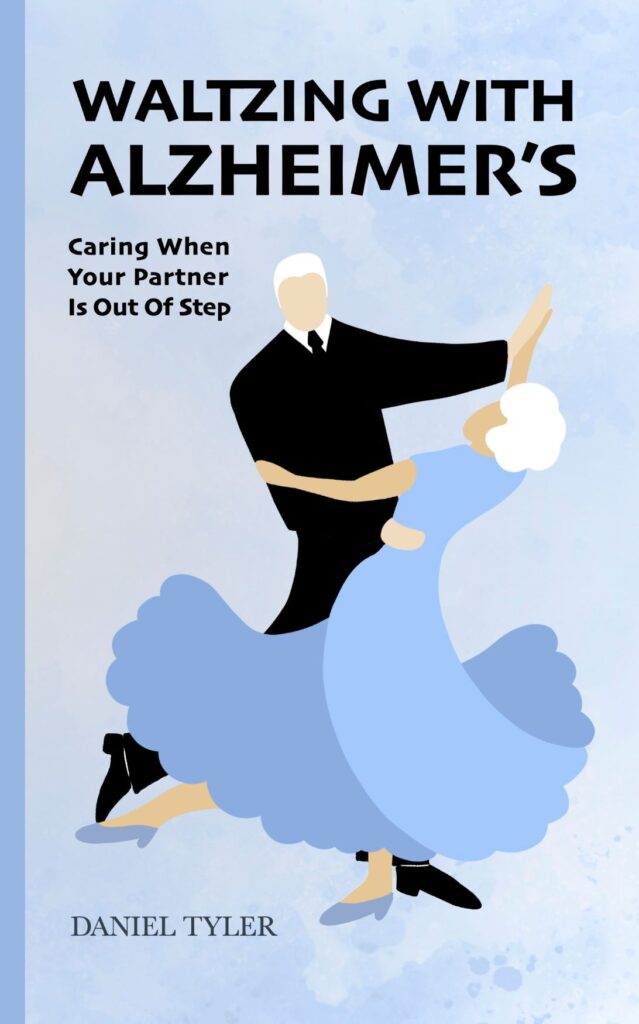Waltzing with Alzheimer’s
A touching short memoir by Daniel Tyler, an adventurous and youthful retired history professor, who fell in love for 20 years with a classy widow diagnosed midway during their relationship with Alzheimer’s.

While they shared similar values and interests and lived states apart, Colorado-based author, Tyler was about to embark on something totally new.
Can their love hold them together? What about Betty’s only child, a son who is a doctor in Hawaii? How would Daniel navigate Alzheimer’s, his love for Betty, and her son?
Two Lovers
As new lovers, they traveled and enjoyed adventures in retirement after years of work. They also spent time in Hawaii and visited each other’s homes—hers in Ohio and his in Colorado. Like some of today’s independent couples, they each retreated to their respective homes for a while before getting together again.
Unexpected Decisions?
Then in 2012, Betty decided she wanted leave her long-time home in Ohio. She wanted to move to Colorado.
She moved out of her apartment in Cincinnati where for years she had built a network of friends along with scheduled activities. She bought a luxury apartment in downtown Denver’s new high-rise with 24-hour concierge service.
Daniel was happy for her. Yet, when Betty let go of her half-interest in the family’s multi-generational farm, he felt these decisions and subsequent actions were unexpected.
Betty’s behaviors began to change.
Daniel observed his proactive partner growing reticent. Betty could not decide how to furnish her new apartment. Daniel didn’t feel qualified to help. He reached out to her son, who he respectfully refers to as Dr. Dan. The latter hadn’t noticed any changes in his mom.
For the most part, Daniel and Betty enjoyed activities together as they always had. On rare occasions, Daniel felt the need to tiptoe on eggshells due to her sensitivity.
When Betty joined her annual hiking group in the UK, Daniel warned her Cincinnati friends to keep an eye on her. The “American Ladies” wrote to Daniel, confirming his concerns.
Her frequent UTIs didn’t help.
Possible Alzheimer’s? We’re in this together.
A year later, in 2015 and ten years into their relationship, Betty’s doctor observed frontal lobe shrinkage and possible early Alzheimer’s. Now in his 80s, Daniel coordinated with Dr. Dan and his wife. He needed more energy. Meanwhile, Dr. Dan was getting ready to retire. Daniel comforted Betty with words that expressed his intent: We’re in this together. I’ll be by your side. We’ll find a way to make the best of this situation.
They tried therapists, caregivers, and even found a suitable community where she could be safe. The options Betty didn’t outright reject, didn’t work for long.
So, Daniel sold his long-time home. This is where he found peace and tranquility. His home was where he retreated to restore himself. While he and Betty remained unmarried, they bought a small home together.
With the help of caregiver companions, life took a new turn and a workable one much to Dr. Dan’s peace of mind and Daniel needing more caregiver respites.
Communicating with a Person with Dementia
One of Betty’s caregivers refers them to a CCRC set among trees and gardens where Dr. Dan and Daniel believe Betty will be happy. They arrange for a same-day mover to transfer key pieces of her furnishings from her Denver high rise apartment into her room at the CCRC.
While the movers arrange her room to look similar to her apartment, Daniel, Dr. Dan, and Betty enjoy a picnic at Rocky Mountain National Park. A typical visit for Betty and her boys, before they arrive at her new CCRC apartment. Betty may realize something’s a little off, but her two Dans are in the room with her familiar furnishings, so she’s calm, comfortable, and content. They have dinner together as if nothing has changed, watch TV, and spend the night. Dr. Dan leaves after a few days to return to work. Daniel spends more nights until he admits the CCRC management believe he’s overstaying his welcome.

Daniel Tyler writes:
Over the 10 years I dealt with Betty’s dementia, I learned that everyone who is a caregiver has to get used to setbacks. Logic and practicality can be maddeningly absent from the equation. You have to recognize the dominant role of feelings, and you have to approach difficult decisions with a firm understanding that what might work one day may be inappropriate the next.
Despite what Daniel considers are prohibitive costs for most families, the CCRC’s budget grows tighter and services decline. COVID hits and Daniel can’t visit Betty. Betty’s sundowning grows worse.
She survives!
Additional observations:
- This is a unique memoir among “spousal” caregiving books. Daniel and Betty remained unmarried.
- While people with dementia may prefer to use a different term, I found Tyler’s use of “dementia sufferer” a little off putting. People are trying to live their best lives with dementia. “Suffering” adds a victim orientation to the disease, adding to the stigma.
- Daniel includes plenty of color photos throughout which exude a warm feeling like that of a close friend sharing his journey.
A Plea to the Alzheimer’s Association
As others have over the decades, Tyler directs a plea to the Alzheimer’s Association (AA) “to spend more time and use more of its assets to develop professional caregivers.” He adds that most families choose to care for their loved ones at home and need help from competent professionals. He asks the AA to direct more funding to raising the bar for caregivers and caregiving options where there are measurable results.”
Who wants to read a book written by a 90-year-old?
When the publisher contacted The Caregiver’s Voice, I learned more about Daniel Tyler. In his 90s, he has achieved much. He lives with a youthful spirit. His and Betty’s smiles on the back cover express their journey!
From the publisher: https://springcedars.com/bookstore/waltzing-with-alzheimers/
From Amazon: https://www.amazon.com/Waltzing-Alzheimers-Caring-When-Partner/dp/1963117107/








